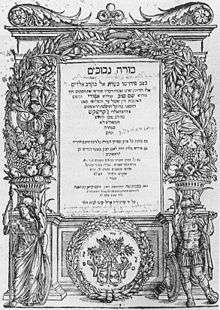God in Judaism
| Part of a series on |
| Judaism |
|---|
   |
|
Other religions
|
|
Related topics |
|
| Part of a series on |
| God |
|---|
|
In particular religions |
|
| Conceptions of God |
|---|
God in Judaism is understood to be the absolute one, indivisible, and incomparable being who is the ultimate cause of all existence. Judaism holds that Yahweh, the god of Abraham, Isaac, and Jacob and the national god of the Israelites, delivered the Israelites from slavery in Egypt, and gave them the Law of Moses at biblical Mount Sinai as described in the Torah. Traditional interpretations of Judaism generally emphasize that God is personal, while some modern interpretations of Judaism emphasize that God is a force or ideal.[1]
God has a proper name, written YHWH (Hebrew: יְהֹוָה, Modern Yehovah, Tiberian Yəhōwāh) in the Hebrew Bible. In Jewish tradition another name of God is Elohim.
Names
The name of God used most often in the Hebrew Bible is the Tetragrammaton (YHWH Hebrew: יהוה). Jews traditionally do not pronounce it, and instead refer to God as HaShem, literally "the Name". In prayer this name is substituted with Adonai, meaning "Master" or "Lord".[2]
Monotheism
Judaism is strictly monotheistic. No consensus has been reached by academics on the origins of monotheism in ancient Israel, but Yahweh "clearly came out of the world of the gods of the Ancient Near East."[3] The worship of multiple gods (polytheism) and the concept of God having multiple persons (as in the doctrine of Trinity) are equally unimaginable in Judaism. The idea of God as a duality or trinity is heretical in Judaism – it is considered akin to polytheism.
God, the Cause of all, is one. This does not mean one as in one of series, nor one like a species (which encompasses many individuals), nor one as in an object that is made up of many elements, nor as a single simple object that is infinitely divisible. Rather, God is a unity unlike any other possible unity.[4]
Since all of existence emanates from God, whose ultimate existence is not dependent on anything else, some Jewish sages perceived God as interpenetrating the universe, which itself has been thought to be a manifestation of God's existence. In this way Judaism can be regarded as being similar to panentheism, while always affirming genuine monotheism.
Kabbalistic tradition holds that the divine consists of ten sefirot (attributes or emanations). This has been described as a strand of Judaism which may seem at odds with Jewish commitments to strict monotheism, but Kabbalists have consistently emphasized that their traditions are strictly monotheistic.[5]
Any belief that an intermediary between humanity and God could be used, whether necessary or even optional, has traditionally been considered heretical. Maimonides writes that
God is the only one we may serve and praise....We may not act in this way toward anything beneath God, whether it be an angel, a star, or one of the elements.....There are no intermediaries between us and God. All our prayers should be directed towards God; nothing else should even be considered.
Some rabbinic authorities disagreed with this view. Notably, Nachmanides was of the opinion that it is permitted to ask the angels to beseech God on our behalf. This argument manifests notably in the Selichot prayer called "Machnisay Rachamim", a request to the angels to intercede with God. Modern printed editions of the Selichot include this prayer.
Godhead
Godhead refers to the aspect or substratum of God that lies behind God's actions or properties (i.e., it is the essence of God).
Rationalistic conception
In the philosophy of Maimonides and other Jewish-rationalistic philosophers, there is little which can be predicated about the Godhead other than its existence, and even this can only be asserted equivocally.
How then can a relation be represented between God and what is other than God when there is no notion comprising in any respect both of the two, inasmuch as existence is, in our opinion, affirmed of God, may God be exalted, and of what is other than God merely by way of absolute equivocation. There is, in truth, no relation in any respect between God and any of God's creatures.— Maimonides, Moreh Nevuchim (Pines 1963)
Mystical conception
In Kabbalistic thought the term "Godhead" usually refers to the concept of Ein Sof (אין סוף), which is the aspect of God that lies beyond the emanations (sefirot). The "knowability" of the Godhead in Kabbalistic thought is no better that what is conceived by rationalist thinkers. As Jacobs (1973) puts it, "Of God as God is in Godself—Ein Sof—nothing can be said at all, and no thought can reach there".
Ein Sof is a place to which forgetting and oblivion pertain. Why? Because concerning all the sefirot, one can search out their reality from the depth of supernal wisdom. From there it is possible to understand one thing from another. However, concerning Ein Sof, there is no aspect anywhere to search or probe; nothing can be known of it, for it is hidden and concealed in the mystery of absolute nothingness.— David ben Judah Hehasid, Matt (1990)
Properties attributed to God
In traditional Judaism, God is conceived of as the eternal, omnipotent and omniscient creator of the universe, and the source of morality. God has the power to intervene in the world.
Maimonides describes God in this fashion: "The foundation of all foundations and the pillar of wisdom is to know that there is a Primary Being who brought into being all existence. All the beings of the heavens, the earth, and what is between them came into existence only from the truth of His being."[6]
Jews often describe God as omniscient,[7] although some prominent medieval Jewish philosophers held that God does not have complete foreknowledge of human acts. Gersonides, for example, argued that God knows the choices open to each individual but that God does not know the choices that an individual will make.[8] Abraham ibn Daud believed that God was not omniscient or omnipotent with respect to human action.[9]
Jews often describe God as omnipotent and see that idea as rooted in the Bible.[7] Many modern Jewish theologians have argued that God is not omnipotent, however, and have found many biblical and classical sources to support this view.[10]
Although God is referred to in the Tanakh with masculine imagery and grammatical forms, traditional Jewish philosophy does not attribute gender to God.[11] At times, however, Jewish aggadic literature and Jewish mysticism do treat God as gendered. The ways in which God is gendered have also changed across time, with some modern Jewish thinkers viewing God as outside of the gender binary.[12]
Kabbalistic tradition holds that the divine consists of ten aspects, called sefirot.
Concepts of God
Personal
.jpg)
Most of classical Judaism views God as a personal god, meaning that humans can have a relationship with God and vice versa. Much of the midrash, and many prayers in the siddur portrays God as caring about humanity in much the same way that humans care about God. Rabbi Samuel S. Cohon wrote that "God as conceived by Judaism is not only the First Cause, the Creative Power, and the World Reason, but also the living and loving Father of Men. He is not only cosmic but also personal....Jewish monotheism thinks of God in terms of definite character or personality, while pantheism is content with a view of God as impersonal." This is shown in the Jewish liturgy, such as in the Adon Olam hymn, which includes a "confident affirmation" that "He is my God, my living God...Who hears and answers."[13] Edward Kessler writes that Hebrew Bible "portrays an encounter with a God who cares passionately and who addresses humanity in the quiet moments of its existence."[14] British chief rabbi Jonathan Sacks suggests that God "is not distant in time or detached, but passionately engaged and present."[14]
It is important to note that "the predicate 'personal' as applied to God" does not mean that God is corporeal or anthropomorphic, views which Judaism has always rejected; rather, "personality" refers not to physicality but to "inner essence, psychical, rational, and moral."[13] Although most Jews believe that "God can be experienced," it is understood that "God cannot be understood" because "God is utterly unlike humankind" (as shown in God's response to Moses when Moses asked for God's name: "I Am that I Am"); all anthropomorphic statements about God "are understood as linguistic metaphors, otherwise it would be impossible to talk about God at all."[14]
According to traditional Judaism, people's actions do not have the ability to affect God positively or negatively. The Book of Job in the Hebrew Bible states: "Gaze at the heavens and see, and view the skies, which are higher than you. If you sinned, how do you harm God, and if your transgressions are many, what do you do to God? If you are righteous, what do you give God? Or what does God take from your hand? Your wickedness [affects] a person like yourself, and your righteousness a child of humanity."
A modern concept that God is in need of human beings has been propounded by Abraham Joshua Heschel. Because God is in search of people, God is accessible and available through time and place to whoever seeks Him, leading to a spiritual intensity for the individual as well. This accessibility leads to a God who is present, involved, near, intimate, and concerned for and vulnerable to what happens in this world.[15]
Non-personal
Although the dominant strain in Judaism is that God is personal, modern Jewish thinkers claim that there is an "alternate stream of tradition exemplified by ... Maimonides", who, along with several other Jewish philosophers, rejected the idea of a personal God.[14]
Modern Jewish thinkers who have rejected the idea of a personal God have sometimes affirmed that God is nature, the ethical ideal, or a force or process in the world.
Baruch Spinoza offers a pantheist view of God. In his thought, God is everything and everything is God. Thus, there can be conceived no substance but God.[16] In this model, one can speak of God and nature interchangeably. Although Spinoza was excommunicated from the Jewish community of Amsterdam, Spinoza's concept of God was revived by later Jews, especially Israeli secular Zionists.[17]
Hermann Cohen rejected Spinoza's idea that God can be found in nature, but agreed that God was not a personal being. Rather, he saw God as an ideal, an archetype of morality.[18] Not only can God not be identified with nature, but God is also incomparable to anything in the world.[18] This is because God is “One,” unique and unlike anything else.[18] One loves and worships God through living ethically and obeying His moral law: “love of God is love of morality.”[18]
Similarly, for Emmanuel Levinas, God is ethics, so one is brought closer to God when justice is rendered to the Other. This means that one experiences the presence of God through one’s relation to other people. To know God is to know what must be done, so it does not make sense to speak of God as what God is, but rather what God commands.[19]
For Mordecai Kaplan, the founder of Reconstructionist Judaism, God is not a person, but rather a force within the universe that is experienced; in fact, anytime something worthwhile is experienced, that is God.[20] God is the sum of all natural processes that allow people to be self-fulfilling, the power that makes for salvation.[21] Thus, Kaplan’s God is abstract, not carnate, and intangible. It is important to note that, in this model, God exists within this universe; for Kaplan, there is nothing supernatural or otherworldly. One loves this God by seeking out truth and goodness. Kaplan does not view God as a person but acknowledges that using personal God-language can help people feel connected to their heritage and can act as “an affirmation that life has value.”[22]
Likewise, Rabbi Zalman Schachter-Shalomi, the founder of the Jewish Renewal movement, views God as a process. To aid in this transition in language, he uses the term “godding,” which encapsulates God as a process, as the process that the universe is doing, has been doing, and will continue to do.[23] This term means that God is emerging, growing, adapting, and evolving with creation. Despite this, conventional God-language is still useful in nurturing spiritual experiences and can be a tool to relate to the infinite, although it should not be confused with the real thing.[24]
According to the Pew Forum on Religion and Public Life's 2008 U.S. Religious Landscape Survey, Americans who identify as Jewish by religion are twice as likely to favor ideas of God as "an impersonal force" over the idea that "God is a person with whom people can have a relationship."[25]
See also
- God in Abrahamic religions
- Holocaust theology
- Holy Spirit (Judaism)
- Shekhinah (divine presence)
References
- ↑ http://www.myjewishlearning.com/article/modern-jewish-views-of-god
- ↑ http://www.hebrew4christians.com/Names_of_G-d/Adonai/adonai.html
- ↑ Smith, Mark S.The early history of God: Yahweh and the other deities in ancient Israel. Wm. B. Eerdmans Publishing Co.; 2nd ed., 2002. ISBN 978-0-8028-3972-5
- ↑ Maimonides, 13 principles of faith, Second Principle
- ↑ Wainwright, William, "Monotheism", The Stanford Encyclopedia of Philosophy (Fall 2013 Edition), Edward N. Zalta (ed.), URL = <http://plato.stanford.edu/archives/fall2013/entries/monotheism/>.
- ↑ Mishneh Torah, book HaMadda', section Yesodei ha-Torah, chapter 1:1 (original Hebrew/English translation)
- 1 2 "Jewish Beliefs about God" in C/JEEP Curriculum Guide American Jewish Committee
- ↑ Jacobs, Louis (1990). God, Torah, Israel: traditionalism without fundamentalism. Cincinnati: Hebrew Union College Press. ISBN 0-87820-052-5. OCLC 21039224.
- ↑ Guttmann, Julius (1964). Philosophies of Judaism: The History of Jewish Philosophy from Biblical Times to Franz Rosenzweig. New York City: Holt, Rinehart and Winston. pp. 150–151. OCLC 1497829.
- ↑ Geoffrey Claussen, “God and Suffering in Heschel’s Torah Min Ha-Shamayim.” Conservative Judaism 61, no. 4 (2010), p. 17
- ↑ "G-d has no body, no genitalia, therefore the very idea that G-d is male or female is patently absurd. We refer to G-d using masculine terms simply for convenience's sake, because Hebrew has no neutral gender; G-d is no more male than a table is." Judaism 101. "The fact that we always refer to God as 'He' is also not meant to imply that the concept of sex or gender applies to God." Rabbi Aryeh Kaplan, The Aryeh Kaplan Reader, Mesorah Publications (1983), p. 144
- ↑ Julia Watts-Belser, “Transing God/dess: Notes from the Borderlands,” in Balancing on the Mechitza: Transgender in Jewish Community, ed. Noach Dzmura (Berkeley, CA: North Atlantic Books, 2010)
- 1 2 Samuel S. Cohon. What We Jews Believe (1931). Union of American Hebrew Congregations.
- 1 2 3 4 Edward Kessler, What Do Jews Believe?: The Customs and Culture of Modern Judaism (2007). Bloomsbury Publishing: pp. 42-44.
- ↑ Abraham Joshua Heschel, God in Search of Man: A Philosophy of Judaism (New York: Farrar, Straus & Cudahy, 1955).
- ↑ Benedictus de Spinoza, The Ethics; Treatise on the Emendation of the Intellect; Selected Letters, trans. Samuel Shirley, 2nd ed. (Indianapolis: Hackett, 1992), 40.
- ↑ Daniel B. Schwartz, The First Modern Jew: Spinoza and the History of an Image (Princeton University Press, 2012), ch. 5.
- 1 2 3 4 Hermann Cohen, Reason and Hope: Selections from the Jewish Writings of Hermann Cohen, trans. Eva Jospe (New York,: Norton, 1971), 223.
- ↑ Emmanuel Levinas, Difficult Freedom: Essays on Judaism, trans. Sean Hand (Baltimore: Johns Hopkins University Press, 1990), 223.
- ↑ Alan Levenson, An Introduction to Modern Jewish Thinkers: From Spinoza to Soloveitchik, 137.
- ↑ Alan Levenson, An Introduction to Modern Jewish Thinkers: From Spinoza to Soloveitchik, 138.
- ↑ Mordecai Menahem Kaplan, The Meaning of God in Modern Jewish Religion (Detroit: Wayne State University Press, 1994), 29.
- ↑ Zalman Schachter-Shalomi and Joel Segel, Jewish with Feeling: A Guide to Meaningful Jewish Practice (New York: Riverhead Books, 2005), 20.
- ↑ Zalman Schachter-Shalomi and Joel Segel, Jewish with Feeling: A Guide to Meaningful Jewish Practice (New York: Riverhead Books, 2005), 8.
- ↑ http://www.pewforum.org/files/2013/05/report-religious-landscape-study-full.pdf, p. 164
Further reading
- Yochanan Muffs. "The Personhood of God: Biblical Theology, Human Faith And the Divine Image". LibraryThing.com. Library Thing.
